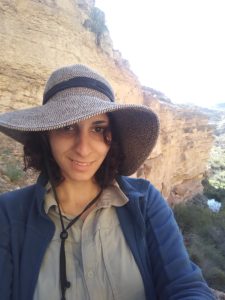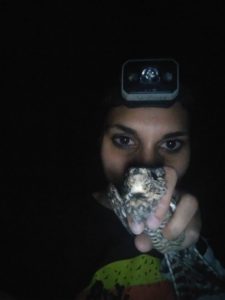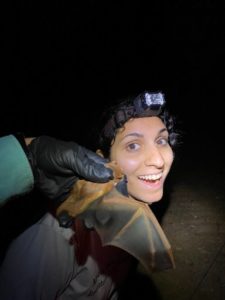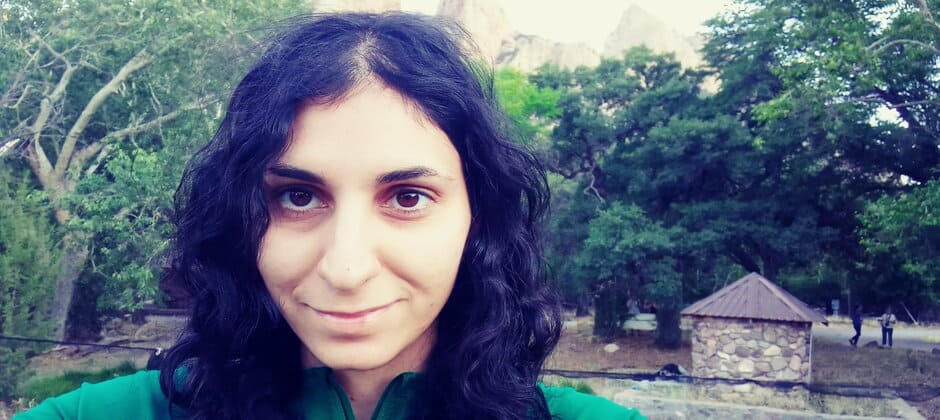Share this article
Wildlife Vocalizations: Zeinab (Rose) Haidar
Wildlife Vocalizations is a collection of short personal perspectives from people in the field of wildlife sciences.

Haidar hikes at Lake Mead National Recreation Area, while conducting spring vegetation surveys.
Credit: Zeinab (Rose) Haidar and Duncan Schanz
My name is Zeinab, but I am best known as Rose. I have worked in the field of wildlife and ecology for many years, and i am now embarking on a graduate degree to become more involved and impactful in wildlife research.
To give a bit of context to my entry into the biological sciences, I would like to start with my cultural background. My family immigrated to the United States from the Middle East in 1989, shortly before my birth. I grew up surrounded by people of my culture and did not learn English well until later in my adolescence. My culture has many attributes that can be perceived as both good and bad. The sense of community, kindness and hospitality are a few that I cling to as I believe all deeds come full circle. The difficult aspect of my culture discourages deviation from our traditions, and sadly many of those traditions look down upon individual growth and independence for women. We are to be perfect mothers, wives and caretakers, and only as intelligent as needed. In my culture you are not to leave your father’s home until you wed, and you are not to leave your neighborhood without a man in your family as an escort. Although difficult, I was able to keep the many aspects of my culture I love, but deviated from the limiting traditions with persistence and determination, slowly changing my family’s perception of “the limits of a woman.”

Haidar with a nighthawk during a bat blitz at Great Basin National Park, where she surveyed bat presence and absence.
Credit: Zeinab (Rose) Haidar and Duncan Schanz
I had always found comfort and curiosity in nature. Although I had trouble reading due to mild dyslexia, I found myself engrossed in books about various organisms and natural processes. I did not come from a family of means or stability, so I spent much of my free time after school at libraries or parks when I could. I decided to pursue further education in wildlife and natural history after high school, despite the difficulty I faced from my family’s expectations and cynicism.

Haidar studied the phylogenetics and biogeography of red bats as part of her thesis research.
Credit: Zeinab (Rose) Haidar and Duncan Schanz
I began my education at Michigan State University the same year I began my first field job. The first time I was engrossed in the field, I knew I found my calling. I fell in love one hot summer evening in Oregon when I was working with spotted owls (Strix occidentalis). I dove in the Umpqua river to cool off in the moonlight and watched thousands of bats emerge from the trees, while salmon the size of my leg tickled past. The frogs and toads sang the most beautiful melodies, while the birds soared above me. I was hundreds of miles from the closest sizable city, and the stars against the mountains were spectacular. I was never bit by one mosquito, and it was the most beautiful and exhilarating night in my life. It was then that I knew what I wanted to truly protect.
I have now been a wildlife biologist for 10 years, which has brought me to five countries and 37 states, and I don’t plan to stop.
Learn more about Wildlife Vocalizations, and read other contributions.
Submit your story for Wildlife Vocalizations or nominate your peers and colleagues to encourage them to share their story.
For questions, please contact Jamila Blake.
Header Image:
Haidar had to push past some of her cultural norms to succeed in wildlife biology.
Credit: Zeinab (Rose) Haidar and Duncan Schanz








